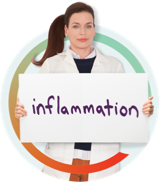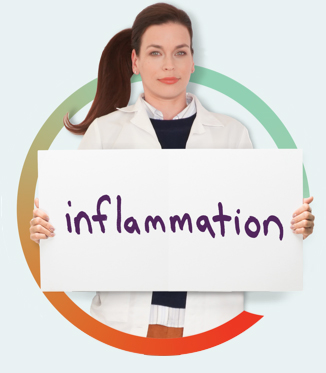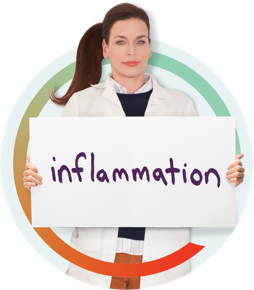What causes eczema? We’re so glad you asked.
There’s no simple answer to what causes your eczema—which just means there’s more for us to learn about it. Let’s take a closer look.
Is there a root cause of eczema? It’s complicated.
While the exact cause of eczema is unknown, researchers do know the immune system is undeniably involved.
With eczema, an overactive immune system produces excess inflammation, which can contribute to symptoms like itch and rash. Inflammation can also cause your skin barrier to become damaged, leading to water loss (dry skin), and allowing irritants to penetrate. Scratching further damages the skin barrier, increasing the exposure to irritants and bringing on even more inflammation, symptoms, water loss, and possibly infection.
While we know irritants and environmental factors alone aren’t the cause, some people living with eczema also try to manage their triggers. For people with eczema, triggers can be anything that's more likely to worsen symptoms and activate a response from the immune system. Researchers also know genetics can play a role in this chronic inflammatory disease, so you may already know that someone in your family has eczema.
Inflammation: When a good process turns bad
Under normal circumstances, inflammation is the body's healthy and completely natural reaction to defend against everything from viruses and bacteria to irritants and toxic chemicals. It can even help with healing physical injuries.
Properly functioning inflammation will eventually run its course, but with eczema, the inflammation occurring within the skin lasts too long. This long-lasting, or chronic inflammation comes from an overactive immune system and can contribute to eczema symptoms as well as changes in other parts of your body.
And remember, you can always talk to your doctor about reducing inflammation, which is one of the goals of many eczema treatment options.
What type of treatment have you been prescribed most recently for your eczema (atopic dermatitis)?
What type of treatment have you been prescribed most recently for your eczema (atopic dermatitis)?
Thanks for taking part in the science!
Are you finding treatment types confusing? We've got you covered. Learn more about eczema treatments.
Eczema Eureka #002:
Filaggrin (Fil-ag-grin) helps protect your skin
It may sound like you just sneezed, but filaggrin is actually the name of a specific protein that could play a key role in your eczema.
Filaggrin helps our bodies maintain a protective barrier on the top layer of the skin. But research shows that some people with eczema have a mutation of the gene responsible for filaggrin.
Lacking this protein can lead to a skin barrier dysfunction that allows moisture to escape so it cracks and allows irritants to enter, which can cause the skin to become dry, inflamed, and prone to infection.
If the genes fit: A family history of eczema
Since we know that genetics can be one of the factors in why people have eczema, it’s common to have family members who’ve also been diagnosed before.
And while eczema is certainly not the same as an allergic reaction, the genetic factors that contribute to allergies and/or asthma may be connected as well. So, a family history of eczema or asthma, hay fever, or other allergies is a strong risk factor for having an overactive immune system and developing eczema.
But since genetics aren’t the only factor that can lead to eczema, you can still have it even if your family doesn’t.
After learning about eczema’s possible causes, it’s time to start















